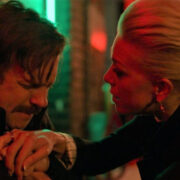QUEEN OF THE DESERT: The World Owes Another Film To Gertrude Bell
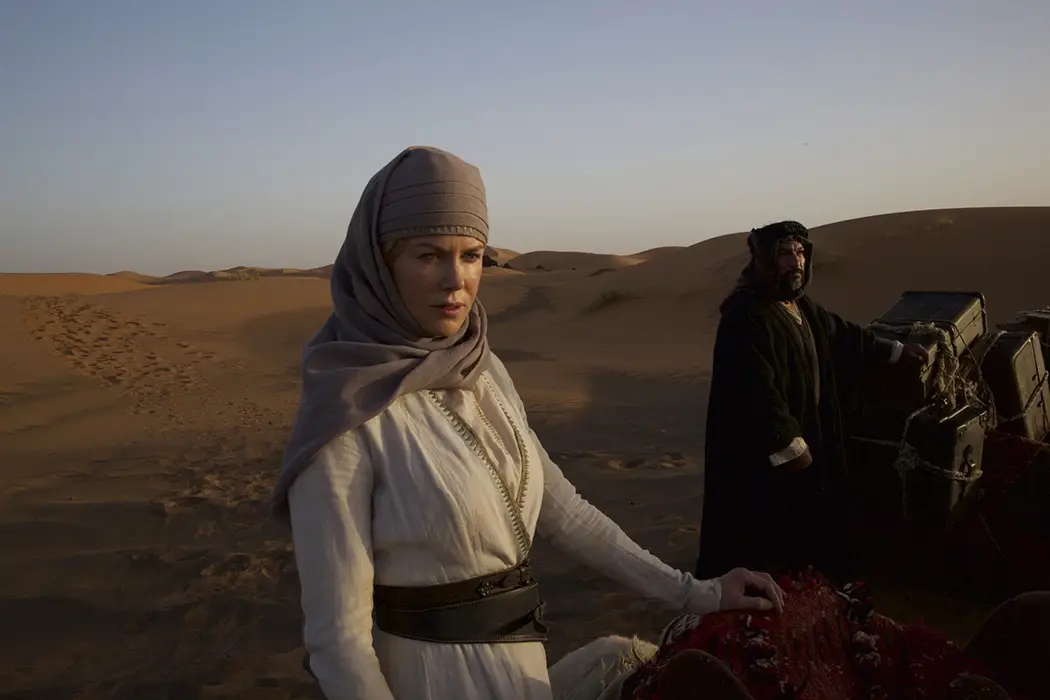
Salamis is a writer from Cyprus who currently resides in…
It is a dangerous thing to attempt to draw a line between fact and fiction. There are documentaries that tell their stories as faithfully as possible to the truth, and biography films, not as committed to reality as documentaries are, but doing so on purpose in order to convey the feelings of the audience. Although Letters from Baghdad (2016), the documentary film from BBC, gives Gertrude Bell what she deserves, considering the difference in popularity between documentaries and biographical/historical/drama films, the world definitely needs another film to reveal the real Bell.
Despite having a strong director behind it, Werner Herzog, whom we include among our favourite directors with his Fitzcarraldo (1982), and despite focusing on a strong historical figure – an intelligent, independent, intrepid, adventurous, and self-empowered and empowering woman, who disobeyed the norms of the Victorian era and drew borders in the Middle East – and lastly, despite having an Academy Awarded actress, Nicole Kidman, starring in the film, Queen of the Desert destroys its own potential and remains an essential void, an ill-represented biopic that fails to communicate both the depth of such a significant historical character and the difficulties of being a Victorian woman traveller.
The film opens with powerful, captivating oriental music (composed by Klaus Badelt). We see sand swirling above a group, riding camels through the desert. The hypnotic music of the east, the sublime feeling of the desert, the magnetic beauty of slow travel… The first minute and a half makes us believe we are about to see something magnificent. Then the music shifts to the soft, velvety strain of a piano playing Western classical music as we watch the same people from a distance. This transition of sound from the East to the West, mirrors the film itself; it is meant to prepare us for a dichotomy, an expected one in depicting a Western traveller, especially a woman, alone in the Middle East in the nineteenth century.
The necessary emotions fail to be evoked
Subtitles appear: ‘The onset of the First World War hastened the demise of the Ottoman Empire, which had ruled the Middle East for five centuries. The colonial powers set their eyes on dividing the spoils…’ Then we see a group of men sitting in a gloomy room with map-covered walls, doing just that – dividing the spoils – with cigars in their mouths and expensive liquor in their glasses.
‘Who knows best about Bedouin tribes?’ asks Churchill. The answer is ‘the woman’.
Which woman?
Is it the woman we see in the next scene at an extravagant dinner party, whispering ‘God, please send me an earthquake’ as she moves with boredom between dance partners, sick of their blarney and hubris? Is it the woman we see begging her father like a spoiled child to send her to Arabia, to India, to anywhere far away and exotic?
These early scenes, the party and teatime at Bell’s mansion, are meant to prepare us for an adventurous character who refuses to conform to the rules of that era, yet the preparation seems to be done so hastily and carelessly we don’t really feel her boredom. One expects to feel a sensation of emptiness, the domestic ennui of a woman trapped in a setting which does not quite fit her true essence. One expects an experience similar to that of looking at the painting Solitude by Frederic, 1st Baron Leighton of Stretton. It is Herzog, after all, with whom we fell in love for his depiction of isolation in The Enigma of Kaspar Hauser (1974).
It is only the beginning, we say, let’s wait until we travel to Tehran with her, where she has been sent by her father to stay with her uncle at the embassy. It is there that Bell enters not only diplomatic circles but also a miserable and desperate chain of love affairs.
On her first night in Tehran, under the celestial beauty of Persia, she meets Henry Cadogan (James Franco), an embassy man, and they fall in love at first sight. They share the passion of poetry, and the glories of nature. During their tête-à-têtes, Cadogan teaches her to speak Persian while visiting his favourite secret corners of the city. These places are exquisitely delightful; indoor gardens and outdoor bazaars, the sublime infinity of the desert, the scenes hit all senses and are perhaps the best thing about Queen of the Desert. But again, it lacks depth even in the affair’s climactic scene, the emotions somehow do not reach the audience which has waited so long for something to happen.
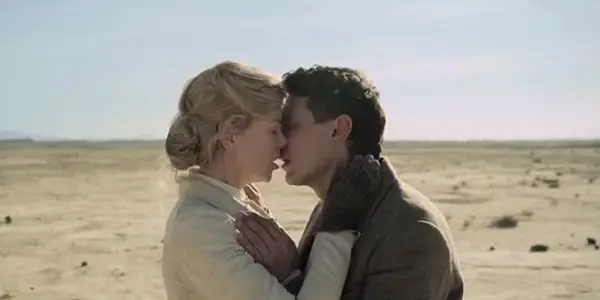
Sometimes – very rarely – we are reminded that the story is about Gertrude Bell, ‘the female Lawrence of Arabia’, one of the bravest, most adventurous women of the era, who made fearless expeditions into unknown territories, through some daring scenes, such as playing puss in the corner with Cadogan atop a desolated desert ruin, the Tower of Silence – where Zoroastrians once rid themselves of their dead – where they see a vulture eating its breakfast.
In the middle of Queen of the Desert we understand that this film is not about the adventures of Arab-world kingmaker Bell, it is not about her ambition, her determination, her problem-solving abilities, her bravery, or her interactions with the tribes. So, we say, it might well be about her unfortunate love life. Unfortunate in that her father does not approve of her relationship with Cadogan, and when she travels to England to fight for her love, the news of Cadogan’s death follows her.
However, if we are meant to experience her inner journey, rather than her accomplishments in the outer world, then we expect emotional complexity from the character. This depiction of grief, which could explore the avenues of her inner world, fails when we are simply left alone with her reading the poetical works of Hafez.
After Cadogan’s death, Bell closes the gates of her heart. When she returns to the Middle East three years later, her ‘heart belongs to no one now but the desert’, which might very well explain the surplus of beautiful desert scenes. Again, we see her cavalcade slowly riding across the desert, backed once again by oriental music. Bell’s head is covered, her look determined. Yes, this is the film we were prepared to see, it is a shame that it takes half of Queen of the Desert for it to begin.
Lack of adventure, lack of rhythm, lack of emotion, and lack of character depth
At the British Council in Amman, she is surrounded by different men now – including British Major Richard Doughty-Wylie (Damian Lewis), a married man with whom she soon enters another ill-advised relationship. These men are trying to convince her not to go to desert on her own, in this time of war. She is not swayed and leaves, but Turkish officials try to arrest her because of this unpermitted journey. However, her servant Fattuh (Jay Abdo) is in possession of a forged document, so nothing happens except some more camel rides and a long bath scene among the camels at sunset. Yes, she travelled with her bathtub. Then some more camel rides, with her silk-linen scarf blowing in the wind.
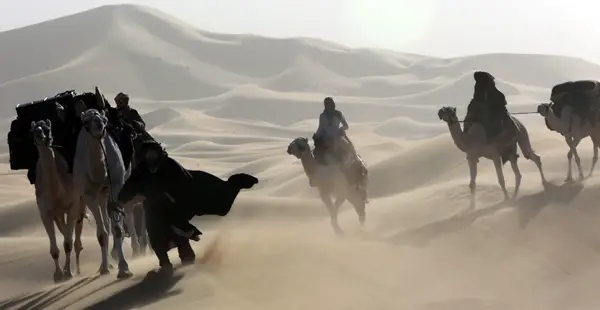
We see her meet Lawrence of Arabia – depicted as a spoiled adolescent – at Petra and not falling in love with him, then we see her at the embassy in Damascus, informing Richard Doughty-Wylie about her next journey, whereupon she falls in love with him. So that she may protect herself from the cruelty of the Druzes, Richard gives her his precious pistols.
Nothing really happens in this film. She visits consuls, tells the officials about her journeys, the officials refuse to let her go, she doesn’t listen and goes, we see more camel rides, and then she returns to a consul with no trouble. Then the same thing happens again. And again.
When she returns to Damascus, to inform Richard about her next journey to Hayr, a forbidden land, their relationship deepens.
‘Miss Bell, will you be quiet, finally something happened. The bullets’, says Richard when she profusely apologises for giving away his present, the pistols, to the Druze sheikh, with whom she spoke of poetry in his tent. Yes, on her most recent journey, she has been kidnapped by the Druzes, getting herself wounded on her arm (a very minor wound indeed), then meets their sheikh. They talk of poetry, of the beauty of Paris, of Baudelaire, of Virgil, and again, she is set free with no hassle.
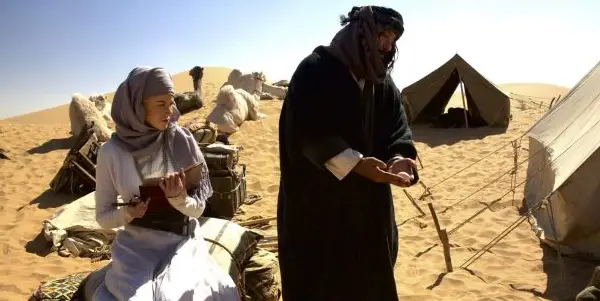
But Richard is right, something finally happened! The bullets! Although it’s a very minor wound, and the trouble ends with a musical feast, we finally see that she got herself in a little trouble, the first serious trouble in the course of Queen of the Desert. At last, some action. And yes, believe it or not, this film is about a woman who disregarded authorities and set out for dangerous lands on her own. Can’t we expect a little more adrenaline?
Leaving the controversial topic of whether Bell was actually a spy or not, at Damascus, the British Empire proposes that she spy for them. She clearly refuses. After more romantic walks with Richard, he gives her a horse as a gift, which she barters at the bazaar for four camels, and again, we see the camels moving slowly through the desert during another sandstorm, while we listen to the correspondence between Bell and Richard.
Another armed blockade – enough with the teasing of the audience, Herzog, we all know how this is going to end, she will read a poem or sing a song to the leader of the tribe – and soon she is under the hospitality of one of the great chiefs of Bedouins, listening to him tell great desert stories while dining together. This time, she is giving away her binoculars.
The second half of the film repeats this vicious pattern: Lack of adventure, lack of rhythm, lack of emotion, and lack of character depth.
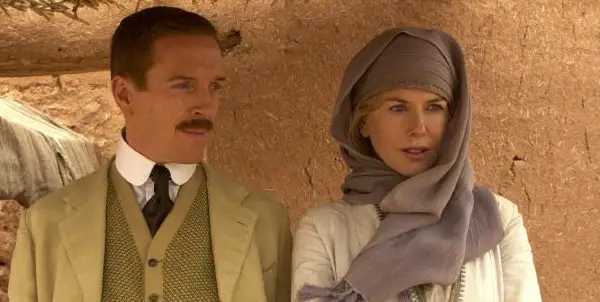
Then she is back to Damascus, to tell Richard that she is finally ready for a relationship despite his wife, but another unfortunate thing happens; Richard leaves for Europe to serve in the war. Gertrude is not only an adventurous traveller but an oriental secretary of the Middle East when she hears about Richard’s death in the war. No need to say that we again struggle to engage with her feelings.
Queen of the Desert: Merely “pictures”
If this film is about Bell’s well-mannered negotiations with Bedouin tribes, if it is about her gracious character, the depiction of this great woman truly fails. If this film is about a Victorian woman travelling to the Middle East, it does not in the least communicate the difficulties of being a Victorian woman traveller. If the film is about the way she is haunted by her romantic and desperate love affairs, it again fails for lack of feeling. Queen of the Desert not only fails to represent Gertrude Bell in her true historic context but is also inevitably shallow in its failure to convey internal feelings to the audience.
With its dearth of worthwhile content, its shallowness of character, and its failed continuity of plot, its vicious pattern of lack, Queen of the Desert is a film made as if to remind us of why we call films ‘pictures’, since the only good thing about the film is its mise-en-scenes. The very fabric of the film is about the beautiful portrayal of the desert, but don’t you think the queen of the desert deserves better than that?
What are your thoughts on Queen of the Desert?
Does content like this matter to you?
Become a Member and support film journalism. Unlock access to all of Film Inquiry`s great articles. Join a community of like-minded readers who are passionate about cinema - get access to our private members Network, give back to independent filmmakers, and more.
Salamis is a writer from Cyprus who currently resides in Canterbury, England. Her academic background spans the fields of philosophy of art, philosophy of film, and philosophy of literature. She received her master degrees in Philosophy from University of Dundee and in Philosophy of Art and Literature from University of York. Passionate about travelling and writing, she has published three travelogues and her first novel is in progress. She is currently doing her PhD at University of Kent on Contemporary Novel where she teaches Creative Writing. She enjoys literary traveling and manages www.literary-traveller.com. She is a film aficionado, yet because of her habit of pausing films for taking notes, she is doomed to watch them all alone.






